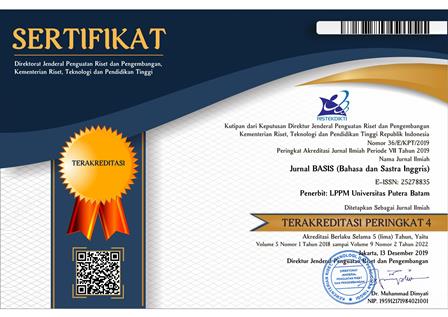BEYOND CRITICAL THINKING IN ACADEMIC WRITING: A DISCOURSE PERSPECTIVE
DISCOURSE PERSPECTIVE Misdi, Nurani Hartini, Dian Farijanti, Department of English Education, University of Swadaya Gunung Jati Cirebon, Indonesia misdirina@gmail.com*, nuranihartini@gmail.com, dian_farijanti@yahoo.co.id
Keywords:
books, journal, critical thinking, critical reading, self-driven academic writingAbstract
The phenomenon of critical thinking, as one aspect of learning experiences, is challenging. Yet, it reflects students’ ideas and understanding of particular matters, especially in academic writing among the English education institutions. Thus, this study was aimed to investigate how undergraduate students fashioned their understanding of being self-driven in writing research proposal relating to reading skills. The research questions drop into two big areas: 1) How is critical thinking reflected in research proposal writing, 2) What are evidences of being critical in addressing research proposal? Having three sessions of in-depth interview, fifty seven students of English department of a private university in West Java, Indonesia were involved in the reflection of their writing and reading experiences during the study. The data were collected through interview and document observation. The findings suggest that first, the critical writing is reflected by such citation and elaborative sentences as the distinctive writing features of academic writing. Second, the extended description and elaboration are made due to reading constraint. Books are mainly the sources, whereas research journal articles are still less appreciated. Thus, reading is defines as the evidence of being critical. The results of the study play significant contribution in building critical thinking, critical reading, and critical writing as self-awareness manifesto among the students of English education.
References
Chafee, J. (2000) Thinking Critically. USA: Houghton Mifflin Company
Chaffee, J., McMahon, C., & Sout, B. (2002) Critical Thinking, Thoughtful Writing: A Rhetoric with Readings. (2nd Ed). USA: Houghton Mifflin Company
Coulthard, Malcolm & A. Johnson (2007) An Introduction to Forensic Linguistics : Language in Evidence. NY: Routledge
Direktorat Jenderal Pendidikan Tinggi. (2012). SK No. 52/E/T/2012 tertanggal 27 Januari 2012 tentang Publikasi Karya Ilmiah (Available on www.dikti.go.id)
Drisko, J.W. (1997) Strengthening Qualitative Studies and Reports: Standards to Promote Academic Integrity. Journal of Social Work Education Vol. 33, No. 1 (Winter 1997), pp. 185-197 Published by council on Social Work Education. Available on www.jstor.org
Emilia, Emi (2011) Pendekatan Genre-based dalam Pengajaran Bahasa Inggris: Petunjuk untuk Guru. Bandung: Rizqi Press
Gebhard, J.G. (2009) Teaching English as a Foreign or Second Language: A Self-Development and Methodology Guide (2nd Ed). Michigan: MUP
Johanson, R. (2001) The Self-Reported Perspectives Regarding Academic Writing among Taiwanese Graduate Students Specializing in TEFL. ERIC: exas Papers in Foreign Language Education, v6 n1 p19-35 Fall 2001 (available on www.eric.gov)
Martin, J.R. & D. Rose (2004) Working with Discourse: Meaning beyond the Clause. London: Continuum
Misdi (2013) Tasks and Socio-affective Learning Strategies of Good Language Learners. Proceeding: TIE ALLSAW ISSN 2337-5043 University of Galuh
Mirahayuni, N.K.(2002) Investigating Generic Structure of English Research Articles: Writing Strategy Differences between English and Indonesian Writers. TEFLIN Journal: A publication on the teaching and learning of English, Vol. 13, No. 1 2002 (www.teflin.org)
Swalles, J. & C.B. Feak (2008) Academic Writing for Graduate Students: Essential Tasks and Skills. (2nd Ed). USA: UMP
Yoshikane, Fuzuki (2013) Multiple regression analysis of a patent’s citation frequency and quantitative characteristics: the case of Japanese patents. Scientometrics July 2013, Volume 96, Issue 1, pp 365-379
Downloads
Published
Issue
Section
License

















